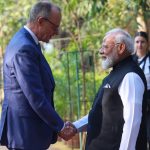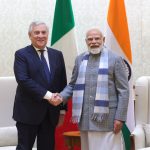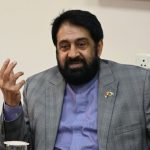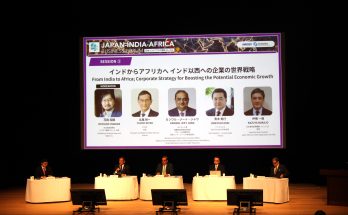It’s a digital bridge connecting the two emerging growth poles of the world in a transformational project of mutual empowerment and resurgence. Blending technology, innovation and creative diplomacy with the overarching project of socio-economic transformation and sustainable development, the Pan-African e-Network is bridging the digital divide across the African continent and is bringing tele-medicine and tele-education to the African people living thousands of miles away by linking them to premier educational institutions and super-specialty hospitals in India. The path-breaking e-network has emerged as a radiant example of South-South cooperation and underlines the creative possibilities of harnessing ICT to catalyze lasting socio-economic changes.
Genesis: Power of Idea
The pioneering idea behind the showpiece digital connectivity project was born eleven years ago in the mind of India’s eminent scientist and thinker, the then President A.P.J. Abdul Kalam. Addressing the Pan African Parliament on September 16, 2004 in Johannesburg, South Africa, which was attended by many representatives of the countries of the African Union, President Kalam unveiled the “concept of a Pan African e-Network on behalf of India for providing seamless and integrated satellite, fiber optics and wireless network connecting the African countries.” The concept, President Kalam has written, was animated by his independent study of the communication, healthcare and education needs of friendly African countries.
Scope and implementation of the project
The idea acquired a life of its own quickly, with the project report completed in a record time of four months. It was coordinated by Ministry of External Affairs (MEA), with technical experts drawn from President’s Office, Department of Space and Telecommunications Consultants India Limited (TCIL) in 2005. In sync with the culture of consultation that defines the multi-faceted India-Africa project partnership, the MEA extensively engaged with African Union (AU) and member countries in this period. The process culminated in the signing of the MoU between India and the African Union on October 27, 2005, marking the beginning of the operationalization of the project that will set new benchmarks for sustainable development partnership between India and Africa.
While India’s Ministry of External Affairs is the nodal ministry for the project, TCIL is implementing the project on a turnkey basis. The first phase of the project, covering 11 countries, was inaugurated on February 26, 2009 by India’s then External Affairs Minister Pranab Mukherjee, who is now the president of India. The second phase was launched on August 16, 2010 and brought 12 more African countries within the compass of this ambitious project that is scripting a new path of salvation for the African people through better health and education. The project is equipped to support e-governance, e-commerce, infotainment, resource mapping and meteorological and other services in the African countries. The project also includes setting up a highly secure “VVIP” network between offices of the heads of state or government across Africa. Thirty VVIP nodes have been set up in African countries for video-conferencing among the heads of states. As of now, the Pan-Africa e-network has come to encompass 48 African nations which have signed bilateral agreements with TCIL for the project.
Another outstanding feature of the project is its sheer cost-effectiveness. Funded by the Indian government, the e-network has emerged as the biggest project of distance education and tele-medicine ever undertaken in Africa. The project was approved by the Union Cabinet of India on July 5, 2007 at a budgeted cost of Rs.542.90 crores (US$ 125 million) which included, among other things, the cost of supply, installation, testing and commissioning of hardware and software, end-to-end connectivity and satellite bandwidth.
Transformational Project: Impact Assessment
The visionary project has earned rich praise for its pioneering idea of using ICT a catalyst of change and has garnered many accolades, including the prestigious Hermes Prize for innovation in the field of sustainable development. The prize was announced by the European Institute of Creative Strategies and Innovation, a think tank that promotes strategies for innovation and renewal in Europe and worldwide, at a meeting in Paris four years ago. The long-distance interaction between India’s Minister of External Affairs and ministers from various African countries during the launch of the second phase in 2010 at the TCIS office in New Delhi brought out vividly enthusiasm of African countries for the project. In Gaborone, Botswana’s then Minister of Education and Skills Development Pelonomi Venson-Moitoi stressed that her country was looking towards more collaboration with India, describing it as a “centre of excellence”, especially in information technology. Egypt’s then Minister for Communication and Information Technology Tarek Mohamed Kamel was profoundly grateful that the Alexandria University will be the hub for e-learning for the network in North Africa.
But more than official rewards and encomia, what sets the project apart is its sheer impact on transforming lives of ordinary people living across the resource-rich African continent. Under the tele-education component of the network, more than 2000 students from Africa have been enrolled in five different top ranking universities in India in a host of disciplines like MBA, Master in Finance Control, PG Diploma in IT, M.Sc. in IT and Bachelor in Finance & Investment Analysis. Regular tele-education live sessions have elicited an enthusiastic response from African students. Tele-medical consultations have also started between the African doctors and the Indian specialists. Nearly 700 Continued Medical Education (CME) lectures have been delivered by Indian doctors from top Indian super specialty hospitals. Energised by the African response, India has even offered training at the regional level by conducting workshops in the tele-medicine and tele-education modules for optimizing benefits of the project.
The tele-medicine sessions under the e-network project has proved to be extremely valuable in providing timely and affordable healthcare and specialist advice to patients sitting thousands of miles in Africa. In particular, African leaders and ministers have acknowledged the life-saving intervention via the tele-medicine route to people living in the rural hinterland of the continent. It has been widely recognised that the overall costs for providing treatment through tele-medicine method are less than the cost by conventional method. The CME System, say informed observers, provides a suitable platform to the practicing doctors to not only seek expert guidance but also for keeping them updated with latest breakthroughs and advances in the field of medicine and healthcare. The training component, in particular, is designed to bolster the long-term capacity of Africa’s emerging health sector.
Similarly, tele-education has been quite successful by creating electronic virtual classroom and bringing together some of best Indian teachers with African students. The feedback suggests that tele-education has proved to be a useful medium to promote creative and reflective thinking.
Knowledge Partnership
The e-network project, therefore, telescopes the trinity of India’s engagement with Africa pivoted around Trade, Training and Technology. Placing the project in the larger context of its ripple effects on socio-economic landscape in African countries, President Kalam has summed up its essence. “PAN African e-Network is an enabler which has a cascading effect on the socio-economic development of many nations and societies. Enterprises and institutions of tomorrow should look at the avenues of bringing about value addition in such enablers which change the environment and rate at which development takes place,” he wrote in an article for “Two Billion Dreams: Celebrating India-Africa Friendship.” The progenitor of the e-network has described the network as “a model of international social responsibility” that could be emulated by other nations in their partnerships with Africa. “Our efforts aim at sharing the knowledge gained among the friendly nations, so that India, with its mission of a knowledge society, holds the hands of other developing nations together to achieve sustainable development across the world,” says Kalam.
The project is being keenly observed by Africa watchers as an example of the kind of initiative Africa needs to empower its people and better its chances in a rapidly globalising world as opposed to extractive and resource diplomacy practiced by many African countries. The project will also aid Africa’s journey towards achieving Sustainable Development Goals (SDGs) targets in education and the health sector and enrich the lives of its predominantly young population. The success of Pan African e-Network project forms the basis of India’s proposal to set up an India-Africa Virtual University during the India-Africa Forum Summit at Addis Ababa in 2011.
With its focus on knowledge-sharing and skill-building, the e-network project epitomizes India’s development-centric engagement with Africa and the global South. The e-network project has, therefore, to be seen in the larger context of India’s collaborative development partnership to partner the African continent in its ongoing resurgence. It is with this larger vision of aiding Africa’s quest to become a knowledge-driven society that India is looking to set up over a hundred training institutes across Africa. These training institutes encompass diverse areas ranging from agriculture, rural development and food processing to information technology, vocational training, English language centres, and entrepreneurial development institutes.
Intertwined Dreams
The e-network project is moving incrementally towards fulfilment of its stated goals and objectives at a time of renewed optimism about the emergence of the global South. In many ways, the narratives of a rising India and the unfolding African resurgence are intersecting at multiple points, opening up new avenues for scaling up the India-Africa partnership by using the power of innovation, technology and ideas. In an interview to Africa Quarterly, Ghana’s then president John Kufuor envisaged a marriage of India’s expertise and Africa’s resources to fructify the full potential of the African continent. No project epitomises this synergy better than the pan-Africa e-network project, which is rightly seen as “a shining symbol of South-South Cooperation.”
The tele-medicine and tele-education components of the e-Network are critical to long-term transformation of Africa to achieve lasting resurgence. The demographic dividend, shared by both India and Africa, with the bulk of their population in the age group 19-35, is set to bring the two sides closer in building a multi-pronged partnership in health and education sectors. The e-Network project is also a classic illustration of the ideals of equity and inclusive growth inherent in South-South cooperation, which contrasts starkly with the OECD model of donor-recipient or patron-client relationship. Innovative projects like the e-network also offers new possibilities for forging a new vocabulary of India-Africa relations. India’s focus is on the people-rich continent, and not just the resource-rich continent which is eyed covetously by predatory powers. It is this inexhaustible richness of the African people that India, with its proven prowess in knowledge industries and capacity building, is banking on to help fructify the African dream.
The pan-Africa e-network has shown the way to think innovatively and partner Africa in its transformational journey. Buoyed by the success of the project, India is looking to share its expertise with other parts of the global South like Central Asia and Pacific Island Small States. One can expect this arc of knowledge and innovation partnership to widen in days to come.
(This article was originally published India-Africa Partnership: Towards Sustainable Development, published by FIDC and RIS, and co-edited by Mahesh C. Arora and Manish Chand)
Pan Africa e-Network: Implementation Status
Box 1: Participating Countries
The number of AU Member States that have signed the agreement with TCIL: 48
- West Africa: Benin, Burkina Faso, Cape Verde, Cote d’Ivoire, The Gambia, Ghana, Guinea, Guinea-Bissau, Liberia, Mali, Niger, Nigeria, Senegal, Sierra Leone and Togo
- East Africa: Comoros, Djibouti, Eritrea, Ethiopia, Kenya, Madagascar, Mauritius, Rwanda, Seychelles, Somalia, Sudan, Tanzania and Uganda, South Sudan
- Southern Africa: Botswana, Lesotho, Malawi, Mozambique, Namibia, Swaziland, Zambia and Zimbabwe
- Central Africa: Burundi, Cameroon, Central African Republic, Chad, Congo, DRC, Gabon and Sao Tome and Principe
- Northern Africa: Egypt, Mauritania and Libya
Box II: Participating Indian Institutions
Tele-Education Set-up in 5 Indian Universities:
- Amity University, Noida
- IGNOU, New Delhi
- BITS, Pilani;
- University of Delhi
- University of Madras
Tele-Medicine Set-up in 12 Super Specialty Hospitals of India:
- All India Institute of Medical Sciences (AIIMS), New Delhi ;
- Amrita Institute of Medical Sciences, Kochi;
- Apollo Hospitals, Chennai;
- CARE Hospital, Hyderabad;
- Escorts Heart Institute and Research Centre, New Delhi;
- Fortis Hospital, Noida;
- Narayana Hrudayalya, Bangalore ;
- Sri Ramchandra Medical Centre, Chennai ;
- Moolchand Hospital, New Delhi.
- HCG Bangalore
- Dr Bala Bhai Nanavati Hospital Mumbai
- Sanjay Ghandhi Institute of Medical Sciences Lucknow
Box 3: Participating Institutions from Africa
Tele-Education Set-up in 5 Regional Leading University Centers in Africa:
- Kwame and Nkrumah University of Science and Technology, Ghana,
- Makerere University, Uganda,
- Yaounde University, Cameroon.
- Alexandria Faculty of Commerce, Egypt
(Vsat connectivity provided and IT & Tele-Medicine Set-up in 4 Regional Super Specialty Hospitals in Africa viz.
- Chancellor College, Zomba, Malawi
Tele Medicine Set-up in 5 Regional Super Specialty Hospitals (RSSH) in Africa:
- Super Specialty Hospital, Nigeria,
- Super Specialty Hospital, Republic of Congo (Vsat connectivity provided, civil work pending)
- Super Specialty Hospital, Mauritius (Vsat connectivity provided and IT & UPS equipment being installed)
- Alexandria Faculty of Medicine, Egypt ( Vsat connectivity provided and IT & UPS equipment are under customs clearance pending due to packing materials issue).
- Fann Hospital, Senegal
Author Profile

- Manish Chand is Founder and Editor-in-Chief of India Writes Network (www.indiawrites.org) and India and World, a pioneering magazine focused on international affairs. He is CEO, Centre for Global India Insights, an India-based think tank focused on global affairs.
Latest entries
 India and the WorldJanuary 13, 2026India, Germany raise the bar for defence, economic ties
India and the WorldJanuary 13, 2026India, Germany raise the bar for defence, economic ties India and the WorldDecember 12, 2025India-Italy bonding: Tajani’s visit raises the bar for business, maritime ties
India and the WorldDecember 12, 2025India-Italy bonding: Tajani’s visit raises the bar for business, maritime ties In ConversationNovember 26, 2025G20 is a Force for global Good
In ConversationNovember 26, 2025G20 is a Force for global Good articlesNovember 26, 2025Rescuing G20 from North-South divide: Ubuntu Moment
articlesNovember 26, 2025Rescuing G20 from North-South divide: Ubuntu Moment








